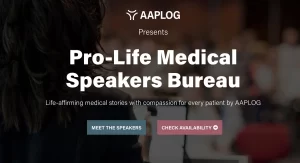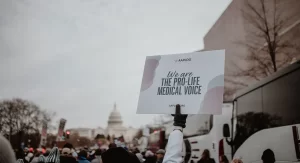In 2024, AAPLOG submitted nine amicus curiae (friend of the court) briefs in seven state, federal, and international abortion-related cases. These legal documents give non-parties to a case the opportunity to offer related context, information, and arguments and can help shape its outcome as courts are required to review them in making their decisions. Medical voices are crucial in these cases and AAPLOG is leading the way in being that voice. The briefs we submitted in 2024 are all linked and briefly summarized below in case you’d like to read them.
Texas v. Zurawski: In this case, the state of Texas appealed a lower court ruling on Amanda Zurawski and co-plaintiffs’ challenge of the state’s abortion law. The plaintiffs claimed that its language permitting physicians to intervene in a pregnancy in the case of complications does not provide sufficient clarity to allow physicians to confidently provide women with emergency care. The amicus brief that AAPLOG submitted to the Texas Supreme Court as members of the Alliance for Hippocratic Medicine disputes this claim, arguing that, “far from unclear, these standards are not new, have never been found unworkable or vague in the abortion context or any other medical context, and the Court has no reason to substitute its judgment for the Legislature’s in this.” Read more here.
Idaho v. United States: This case concerns Idaho’s pro-life law, which the HHS claimed violates the Biden administration’s interpretation of EMTALA. For this case, AAPLOG submitted three briefs objecting to the HHS’s misuse of EMTALA, arguing, among other things, that “efforts to displace state abortion regulations nationwide based on EMTALA rely on a linguistically faulty understanding of the term ‘abortion’ and a factually erroneous description of the nature of emergency medical care.” Our briefs, which fully review why elective induced abortion is not healthcare can be read here, here, and here.
AAPLOG also submitted an amicus brief defending Ecuador’s pro-life law for a case seeking to overturn it. This brief can be found here.
Oklahoma v. HHS: In this case, the pro-life state of Oklahoma challenged the HHS’s decision to revoke a family planning grant on the grounds of the state’s refusal to refer Oklahomans for abortion as a condition for the grant. In its two amicus briefs, AAPLOG and defends the state of Oklahoma on the grounds of conscience rights:
Rights of conscience are at the core of our constitutional freedoms. Indeed, “[n]o provision in our constitution ought to be dearer to man, than that which protects the rights of conscience against the enterprises of the civil authority.” These protections are precious for a reason: the conscience not only serves as a moral compass but as a constant source of inspiration to serve others. So it is no surprise that many healthcare professionals put matters of faith and conscience at the heart of their Hippocratic mission to heal and do no harm.
You can read the full briefs here and here.
Kerr v. Planned Parenthood South Atlantic: This case, which is ongoing and will be heard by the U.S. Supreme Court this year, centers around the pro-life state of South Carolina’s efforts to cease offering Medicaid funds to Planned Parenthood due to the latter’s refusal to stop performing abortions. The brief, which defends the state’s right to protect its pro-life values, can be read here.
Georgia v SisterSong: in this case, the state of Georgia is appealing a lower court decision ruling its heartbeat law unconstitutional. In our amicus brief, AAPLOG argues that the law defends the state’s interest in protecting pregnant women and preborn children. Read it here.






